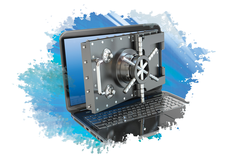Customizing the UEFI boot process
Smart Startup

The traditional BIOS dates back decades and has not been able to keep up with the rapid development of PCs and laptops. Its powerful successor UEFI takes over its tasks and provides more features, more convenience, and better security.
Since 1981, PCs have booted with the help of the Basic Input/Output System (BIOS). Over the years, different manufacturers have continued to expand the BIOS firmware system, but even after all this time, the BIOS system is difficult to adjust and still does not support 64-bit operation.
Back in the late 1992, Intel launched a new initiative to replace the venerable BIOS system with a 64-bit alternative. This Extensible Firmware Interface (EFI) initiative became the Unified EFI (UEFI) Forum in 2005. In addition to Intel, AMD, Microsoft, HP, and other prominent vendors contributed to the UEFI project.
UEFI describes the interface between a computer's firmware and operating system. Like BIOS, the UEFI implementation initializes the hardware components to prepare the launch of the operating system. However, UEFI natively supports 64-bit architectures, enables graphical user interfaces, and can protect against malicious software by only allowing signed operating systems (a feature that has come to be known as Secure Boot).
[...]
Buy this article as PDF
(incl. VAT)
Buy Linux Magazine
Subscribe to our Linux Newsletters
Find Linux and Open Source Jobs
Subscribe to our ADMIN Newsletters
Support Our Work
Linux Magazine content is made possible with support from readers like you. Please consider contributing when you’ve found an article to be beneficial.

News
-
Introducing matrixOS, an Immutable Gentoo-Based Linux Distro
It was only a matter of time before a developer decided one of the most challenging Linux distributions needed to be immutable.
-
Chaos Comes to KDE in KaOS
KaOS devs are making a major change to the distribution, and it all comes down to one system.
-
New Linux Botnet Discovered
The SSHStalker botnet uses IRC C2 to control systems via legacy Linux kernel exploits.
-
The Next Linux Kernel Turns 7.0
Linus Torvalds has announced that after Linux kernel 6.19, we'll finally reach the 7.0 iteration stage.
-
Linux From Scratch Drops SysVinit Support
LFS will no longer support SysVinit.
-
LibreOffice 26.2 Now Available
With new features, improvements, and bug fixes, LibreOffice 26.2 delivers a modern, polished office suite without compromise.
-
Linux Kernel Project Releases Project Continuity Document
What happens to Linux when there's no Linus? It's a question many of us have asked over the years, and it seems it's also on the minds of the Linux kernel project.
-
Mecha Systems Introduces Linux Handheld
Mecha Systems has revealed its Mecha Comet, a new handheld computer powered by – you guessed it – Linux.
-
MX Linux 25.1 Features Dual Init System ISO
The latest release of MX Linux caters to lovers of two different init systems and even offers instructions on how to transition.
-
Photoshop on Linux?
A developer has patched Wine so that it'll run specific versions of Photoshop that depend on Adobe Creative Cloud.
